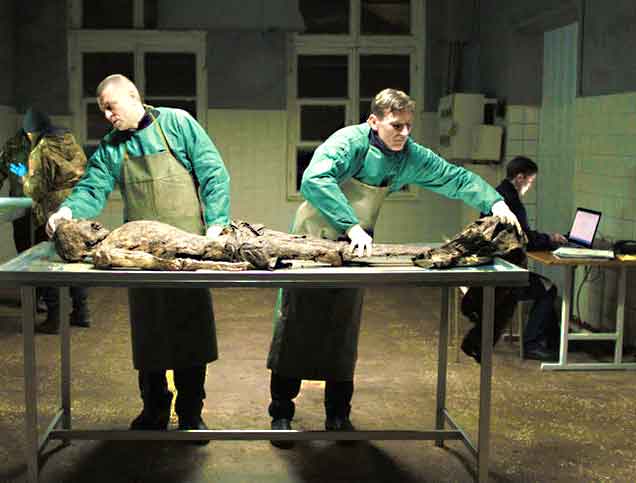 Bleak is the word for this 2019 Russian made dystopian parable (released in the US through Metrograph.com on January 22, 2021). ATLANTIS may purport to be science fiction, but its depiction of the devastated landscapes left in the wake of the war between Russia and the Ukraine, is very of-the-moment.
Bleak is the word for this 2019 Russian made dystopian parable (released in the US through Metrograph.com on January 22, 2021). ATLANTIS may purport to be science fiction, but its depiction of the devastated landscapes left in the wake of the war between Russia and the Ukraine, is very of-the-moment.
Bleak is the word for this 2019 Russian made dystopian parable…
The year is 2025 and the Russia-Ukraine conflict has ended(!). The film begins with infrared footage, seen from above, showing several men digging a grave and tossing a person into it. These men are Ukraine soldiers stationed at an American-run manufacturing plant whose employees are all completely miserable, as are the undertakers tasked with identifying and disposing of the many corpses (most of them burned beyond recognition) that turn up in the area.
What’s important is the rigorous and ultra-spare filmmaking by writer-director-cinematographer Valentyn Vasyanovych…
We follow Sergey, a soldier whose pal Ivan commits suicide early on. This leaves Sergey alone, and stranded when the manufacturing plant closes. He finds work with the corpse interring service, where he meets an attractive young woman named Katya. The two strike up a relationship that does nothing to alleviate the utter bleakness of their universe.
There’s no real story to speak of, with the proceedings feeling more like a collection of short subjects than a unified whole. What’s important is the rigorous and ultra-spare filmmaking by writer-director-cinematographer Valentyn Vasyanovych (whose previous feature, 2017’s downbeat drama BLACK LEVEL/RIVEN CHORNOHO, now feels like a dry run for ATLANTIS). The film is comprised of 28 rigorously composed wide shots that are invariably held for long periods, with great attention paid to fore and background action. Sometime the camera moves (the IMDB’s claim that “The first hour consists entirely of shots with fixed camera” is incorrect) and sometimes it stays still, allowing the viewer a great deal of time to study the detail of each shot.
There’s no real story to speak of, with the proceedings feeling more like a collection of short subjects than a unified whole.
Some of those shots, as in the one in which a massive vat of some unidentified red substance is dumped into a gorge, are gorgeous, and others, like that of a bulldozer carrying a much smaller replica of itself, are quite surreal. There’s also a protracted sex scene, set in the back of a van, that takes place largely in darkness, and from which the camera keeps a discreet distance—meaning the scene, despite the performers’ best efforts, fails to generate any real heat.
The setting and overall atmosphere, however, are faultlessly carried off. Filming in actual war-torn locations with non-professional cast members (note how many of ATLANTIS’s performers have no other screen credits), Vasyanovych has created a dystopia worthy of Tarkovsky or Kubrick. Ultimately, though, this is a film that exists to be admired rather than enjoyed.
Vital Statistics
ATLANTIS
Garmata Film Production/Limelite/Metrograph
Director/Screenwriter/Cinematographer/Editor: Valentyn Vasyanovych
Producers: Iya Myslytska, Valentyn Vasyanovych, Vladimir Yatsenko
Cast: Andriy Rymaruk, Liudmyla Bileka, Vasyl Antoniak, Lily Hyde, Philip Paul Peter Hudson, Igor Tytarchuk, Sergiy Komishon, Sergiy Livitsky, Vitaliy Sudarkov, Kateryna Popravka, Olexandr Sobko

